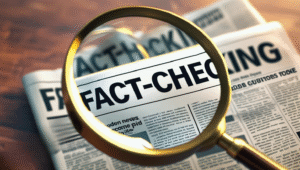In an age of information overload and rampant misinformation, journalism is more critical than ever. However, the very foundations of this crucial profession are being challenged. Eroding public trust, amid bias accusations and sensationalism, threatens journalism’s vital role in a healthy democracy.. So, how can the media reclaim its lost respect and re-establish itself as a reliable source of truth? The answer, unequivocally, lies in the rigorous and unwavering commitment to fact-checking.
Fact-checking, the process of verifying assertions of fact made in news reports, is not a novel concept. It has always been a component of good journalism. However, its significance has amplified exponentially in the digital age, where inaccuracies can spread like wildfire across social media and digital news outlets. This post will delve into the vital role of fact-checking in journalism, exploring its various facets and proposing concrete strategies for media organizations to regain public trust by prioritizing accuracy.
Why Fact-Checking Matters: A Multifaceted Defense Against Disinformation
The importance of fact-checking extends far beyond simply correcting errors. It is a fundamental pillar upon which journalistic integrity rests and serves as a crucial defense against the multifaceted threats posed by disinformation:
Combating Misinformation and Disinformation
At its core, fact-checking aims to distinguish truth from falsehood. By verifying claims, scrutinizing sources, and exposing inaccuracies, it acts as a bulwark against the proliferation of misinformation (unintentional errors) and disinformation (deliberate falsehoods). In a world inundated with fake news and propaganda, this function is paramount.
Upholding Journalistic Integrity and Ethical Standards
Fact-checking is not merely a technical process; it’s a reflection of journalistic ethics. A commitment to accuracy demonstrates a dedication to truth-seeking and a respect for the audience. By holding themselves accountable to high standards of verification, journalists signal their commitment to providing the public with reliable information.
Protecting the Reputation of News Organizations
Reputations are built on trust, and trust is earned through consistent accuracy. News organizations that prioritize fact-checking build a reputation for reliability, attracting loyal audiences and fostering a positive relationship with the public. Conversely, a failure to fact-check can lead to damaging scandals and a loss of credibility.
Promoting Informed Decision-Making
The media plays a crucial role in informing the public about important issues, from political debates to scientific advancements. By ensuring the accuracy of their reporting, journalists empower citizens to make informed decisions about their lives, their communities, and their government. Misinformation, on the other hand, can lead to poor choices and detrimental consequences.
Holding Power Accountable
A free and independent press is essential for holding those in power accountable. However, this function is only practical if the information presented to the public is accurate and verified. Fact-checking allows journalists to scrutinize the claims made by politicians, corporations, and other influential figures, ensuring that they are held accountable for their words and actions.
The Process of Fact-Checking: A Rigorous Examination
Effective fact-checking is not a cursory review but a rigorous and methodical process that involves several key steps:
Source Verification
Identify and evaluate the credibility of sources. Assess expertise, potential biases, and accuracy history. Rely on multiple independent sources for corroboration.
Claim Identification
Identify all factual assertions within the report, including direct quotes, statistics, dates, locations, and verifiable details.
Independent Verification
Verify each claim using reliable sources such as academic research, government reports, expert opinions, and reputable databases. Cross-reference information from multiple sources.
Contextualization
Provide necessary context to ensure accuracy is about more than facts alone—present information in a fair, balanced manner to avoid misrepresentation.
Transparency and Correction
Promptly and transparently correct identified errors. Maintain a clear policy for corrections and retractions, and be open about fact-checking processes.
Leveraging Technology
Utilize technology to aid verification (e.g., reverse image search, metadata analysis, AI-powered tools) but ensure human judgment remains central; technology should augment, not replace, verification.
Challenges to Fact-Checking in the Modern Media Landscape
Journalists face several hurdles in implementing rigorous verification:
Time Constraints
The 24/7 news cycle and social media pressures push for speed, hindering thorough fact-checking.
Resource Limitations
Fact-checking requires dedicated staff, databases, and tools. Smaller outlets often lack these resources.
The Spread of Misinformation Online
Rapid online misinformation, especially on social platforms, challenges the pace of verification.
Political Polarization and Bias Accusations
Growing polarization fuels bias accusations, eroding trust and complicating objective reporting.
Deepfakes and Synthetic Media
Realistic fabricated videos and audio threaten the ability to distinguish truth from fabrication.
Strategies for Rebuilding Trust: A Proactive Approach to Fact-Checking
To overcome these challenges and regain public trust, news organizations must adopt a proactive and comprehensive approach to fact-checking:
Invest in Dedicated Fact-Checking Teams
Establish dedicated fact-checking teams, staffed by experienced journalists with verification and research expertise. These teams should independently verify all factual claims before publication.
Develop a Robust Fact-Checking Policy
Create a clear, comprehensive policy outlining procedures and standards for verifying information. Make the policy publicly available and transparent.
Prioritize Accuracy Over Speed
Speed matters, but accuracy must come first. Resist publishing unverified information, even if it delays a story slightly.
Embrace Transparency and Accountability
Be transparent about fact-checking processes and accountable for mistakes. Promptly correct errors and issue retractions when necessary.
Engage with the Public
Explain fact-checking processes to the public. Host town halls, publish articles and videos on fact-checking, and respond to questions on social media.
Collaborate with Fact-Checking Organizations
Partner with independent fact-checkers to verify information, share resources, develop best practices, and promote literacy.
Educate Journalists on Fact-Checking Techniques
Provide training on best practices, source verification, and recognizing misinformation to empower journalists.
Develop Media Literacy Programs
Support programs that teach the public to evaluate information and identify misinformation critically.
Utilize Technology Wisely
Use technology to enhance fact-checking, but recognize its limits. AI tools can help flag potential falsehoods, but human verification remains essential.
The Future of Journalism: A Return to Core Values
The future of journalism hinges on its ability to regain public trust and re-establish itself as a reliable source of truth. Rigorous fact-checking is not just a best practice; it is a fundamental requirement for responsible journalism. By prioritizing accuracy, transparency, and accountability, news organizations can rebuild their credibility, combat misinformation, and empower citizens to make informed decisions.
The challenges are significant, but the rewards are immeasurable. A commitment to fact-checking is a commitment to the core values of journalism: truth, accuracy, fairness, and public service. By embracing these values, the media can reclaim its rightful place as a vital pillar of a healthy democracy. The path to regaining respect is paved with accuracy, and the journey begins with a steadfast commitment to fact-checking.

